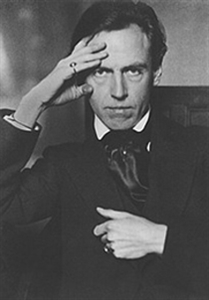Cyril Scott facts for kids
Cyril Meir Scott (born September 27, 1879 – died December 31, 1970) was an English composer, writer, poet, and someone interested in hidden knowledge (an occultist). He created about 400 musical pieces. These included concertos for piano, violin, and cello, as well as symphonies and operas. He also wrote around 20 books and pamphlets about topics like occultism and natural health.
Contents
Biography
Cyril Scott was born in Oxton, Cheshire, England. His father, Henry Scott, was a shipper and a scholar of Greek and Hebrew. His mother, Mary, was a talented amateur pianist. Cyril showed a gift for music from a young age.
When he was 12, in 1892, he went to study piano at the Hoch Conservatory in Frankfurt, Germany. He learned from a teacher named Iwan Knorr. Cyril was part of a group of composers called the Frankfurt Group. They all studied at the Hoch Conservatory in the late 1890s.
When he was 20, a German poet named Stefan George helped Scott arrange a performance of his first symphony. In 1903, he played his Piano Quartet with famous musicians like Fritz Kreisler in London.
In 1902, he met a pianist named Evelyn Suart. They worked together for many years. She helped make his music famous and introduced him to his music publisher, Elkin. Scott stayed with this publisher for his whole life. Evelyn Suart was also interested in metaphysics, which is the study of things beyond what we can see and touch. Through her, Scott also became interested in these ideas.
Music
Cyril Scott was known for trying new things in his music. He experimented with "free rhythm" in his First Piano Sonata in 1909. Some people believe his ideas might have influenced famous composers like Stravinsky, especially in his work The Rite of Spring.
People sometimes called him 'the English Debussy'. This was because his music had a similar dreamy, flowing quality to the French composer Debussy. However, Scott had his own unique style.
Interests in Health and Philosophy
Scott was very interested in alternative medicine, healthy foods, naturopathy, philosophy, and yoga. He believed in natural ways to stay healthy. In his books and pamphlets, he suggested that people should focus on diet and natural remedies for their health. He also recommended foods like black molasses and cider vinegar.
He wrote several books on these topics, sharing his ideas about health and well-being.
Selected Compositions
Cyril Scott wrote a lot of music! Here are some examples of the different types of pieces he composed:
Dramatic Works
These are pieces written for the stage, like plays or ballets.
Operas
- The Alchemist (1917–18)
- The Saint of the Mountain (1924–25)
- Maureen O'Mara (1945)
Ballets
- The Incompetent Apothecary (1923)
- Karma (1924)
Incidental Music
This music is written to be played during a play or film.
- Othello (1920)
- Return to Nature (1920)
Orchestral Music
These are pieces written for a full orchestra.
- Symphony No. 1 in G major (1899)
- Pelleas and Melisanda, overture (1900)
- Symphony No. 3, The Muses, with chorus (1937)
- Symphony No. 4 (1951–52)
Concertos
Concertos are pieces for a solo instrument (like a piano or violin) playing with an orchestra.
- Piano Concerto in D major (1900)
- Cello Concerto (1902)
- Violin Concerto (c. 1925)
- Double concerto for violin, cello and orchestra (1926)
- Piano Concerto No. 2 (1958)
Choral Music
These are pieces written for a choir, sometimes with solo singers and an orchestra.
- Magnificat (1899)
- Nativity Hymn (1913–14)
- Hymn to Unity (1947)
Chamber Music
Chamber music is written for a small group of instruments, usually one player per part.
- Piano Trio in E minor (c. 1899)
- Piano Quartet in E minor (1899)
- String Quartet No. 1 (1919)
- Quintet for clarinet and strings (1951)
- Flute Sonata (1961)
Piano Solo Music
These are pieces written for just one piano.
- Piano Sonata in D major (1901)
- Lotus Land (1905)
- Dance Nègre (1908)
- Piano Sonata No.1 (1909)
- Piano Sonata No.3 (1956)
Other Solo Instrumental Music
- The Ecstatic Shepherd, for solo flute (c. 1922)
- Celtic Fantasy, for solo harp (1926)
- Sonatina, for solo guitar (c. 1927)
Literature
Cyril Scott was also a very active writer. He wrote many books and pamphlets on different subjects.
Prose Books
- 1917 The Philosophy of Modernism, in its Connection with Music
- 1924 Autobiography: My Years of Indiscretion (His life story)
- 1933 Music: Its Secret Influence Throughout the Ages
- 1953 The Boy Who Saw True
Books on Health and Wellness
- 1939 Victory Over Cancer: Without Radium Or Surgery
- 1940 Health, Diet and Commonsense
- 1946 Crude Black Molasses
- 1948 Cider Vinegar
Books on Occultism
- 1935 Outline of Modern Occultism
- 1957 Occultism: An Alternative to Scientific Humanism
Poetry
- 1907 The Grave of Eros and the Book of Mournful Melodies
- 1910 Translation: Poems of Stefan George
- 1915 The Celestial Aftermath
See also
 In Spanish: Cyril Meir Scott para niños
In Spanish: Cyril Meir Scott para niños
- Theosophy and literature § Theosophists as fiction writers
- The Initiate, by Cyril Scott
 | Frances Mary Albrier |
 | Whitney Young |
 | Muhammad Ali |


